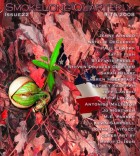I love the name Molly Cottle. How did she end up with such a wonderful name? What’s that name mean to you?
The name is a play on mollycoddle, which broadly means to over-protect. It came at me from thin air with most of the story in tow. Molly’s voice was very clear in my head, and I had to listen. As much as anything, the story is about who is listening to Molly and who is not, what she is and is not allowed to hear.
At SLQ, we had a lot of talk about the spoons and their meaning. Tell us all you can about how spoons found their way into “Two Minute Silence,” their meaning both in this story and outside of it. In other words, I humbly ask, “What do spoons mean to you?”
I’d love to have listened-in to those talks! I wonder what conclusions you all drew? The inspiration for the burial of the spoons came from a real life act of rebellion by my younger brother, just about the one deliberately naughty thing he did as a small child. My mother shared the story only recently, and the image of the child burying the spoons stayed with me.
To me, the spoons in Molly’s story represent a hoard, the stash of secrets which the family is withholding from her. A sort of treasure, if you like, but the currency is debased, one she cannot use. There are other meanings too, some of which I consciously had in mind such as spoon-feeding, weaning, that spoonful of sugar which reputedly helps the medicine go down.
The associations with infancy were strongest in my mind. Molly is desperate to move beyond that period of her life. She is full of inquisitiveness, no longer prepared to swallow what’s fed to her without question. The twisted handles and the horn spoons like ‘smoke and honey’ speak to the manner in which the truth is filtered, withheld or made palatable for Molly.
At the end, “Words”—capitalized, as Emily Dickinson might do. What of Words? And is Silence their enemy?
When I was growing up, ‘Words’, with a capital W, usually meant a ticking-off: ‘I want a Word with you, young lady.’ Oops, I’d been found out. Well, Molly wants to be found out, she wants the chance to speak and be spoken to even if it takes the form of a row.
Silence is Molly’s enemy. There is too much of it in the house where she is growing up. I’m often struck by the adage ‘Silence is golden’, and how true that really is. I think some silences can be golden, for those who choose to respect them, adults who enter into a pact to preserve a peace which cannot otherwise be kept; I don’t believe that talking is always the answer to problems of communication. But it’s unfair, in my view, to expect a child to revere silence at an age when he or she is ripe with questions.
For Molly, silence is a tyranny. Words are her weapon of choice, raised in the form of questions or forced on those around her by means of her act of ‘wickedness’ in burying the spoons.
There is such emphasis placed on the milestones of speech when you’re a child, and it’s such a stony path to negotiate. We laud a child for speaking her first word but by the time she’s just a little older we’re telling her, when it suits us, to be quiet. Children being ‘seen and not heard’ is considered a Victorian stricture nowadays, a form of cruelty, but we don’t hesitate to tell a child to ‘hush’. Censorship is alive and kicking. To give a couple of examples from this story, talking about war and desertion remains very difficult for most people. Most people would rather not raise issues around subjects which make them uncomfortable.
Molly’s on that wheel, being broken by a silence that’s bigger than her emerging intellect. Instinctively she wants to fight – to speak. I think she’s very brave.
“Fat with wickedness.” “Buried.” “Hissed at her heels.” “Like a dragon.” The figurative language tells its own story, or not exactly its own story, but maybe “the plot where the spoons were.” What do you make of the Figurative, here and in general, and its relationship to the Literal?
I love the figurative. That’s where my eye always goes when I read, to the place where the pictures come to life and the narrative takes on a shape that’s personal to me.
I very nearly removed the middle section to this story because it’s not told from Molly’s point of view and it’s largely figurative; the problem being that children tend to take things literally, so I knew it wouldn’t work in her voice. It’s the section that casts Silence in the role of a cat with Molly its prey, hunted down and forced into hiding. I kept it because I wanted that ‘adult’ perspective on Molly’s struggle.
‘Curiosity,’ Molly is told, ‘killed the cat.’ That, I think, is how she hopes to defeat the silence. By not giving up on her questions, and by demanding a sentient and intellectual role in the house. Taking the ‘treasure’ of the spoon collection and burying it will force her family to confront the issue they’ve been avoiding, her grandfather’s desertion and now her father’s. Molly’s at war with silence and this is her final stand.
Begin this answer with the words, “I write.” Complete the sentence. Then, write as many sentences as you’d like, each one beginning with that “I write….”
I write to explore. I write to be read. I write to become less intolerant, of myself and others. I write to shatter my own illusions. I write to learn compassion for all the little things I might otherwise not notice, or feel. I write to give voice to people like Molly. I write to entertain, intrigue and provoke. I write to connect with reality. I write to escape. I write to help others escape, and connect. I write to get better at writing. I write so there will be Words.



 The core workshop of SmokeLong Fitness is all in writing, so you can take part from anywhere at anytime. We are excited about creating a supportive, consistent and structured environment for flash writers to work on their craft in a community. We are thrilled and proud to say that our workshop participants have won, placed, or been listed in every major flash competition. Community works.
The core workshop of SmokeLong Fitness is all in writing, so you can take part from anywhere at anytime. We are excited about creating a supportive, consistent and structured environment for flash writers to work on their craft in a community. We are thrilled and proud to say that our workshop participants have won, placed, or been listed in every major flash competition. Community works.